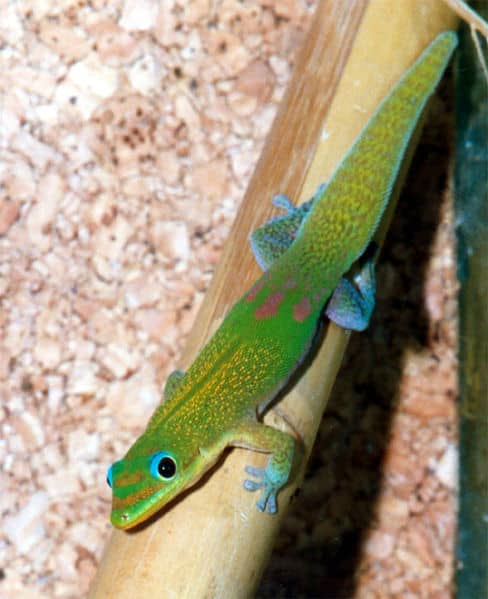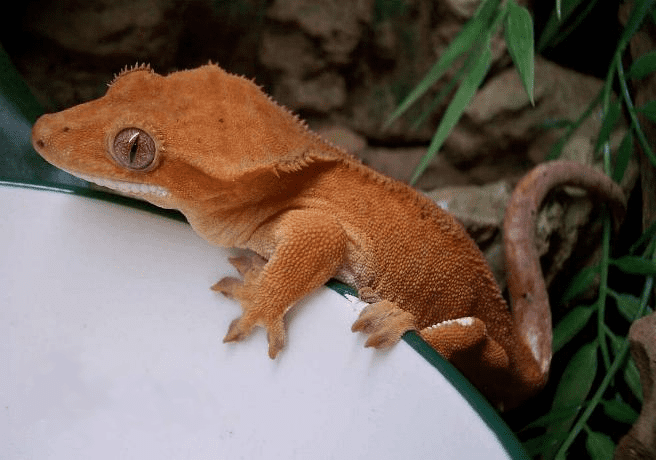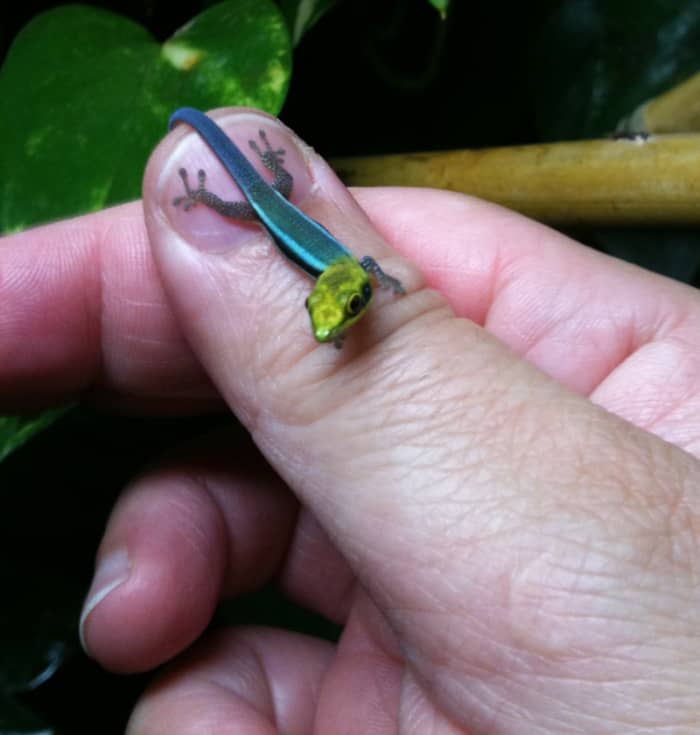Geckos That Are Easy to Take Care of
I am an experienced day gecko breeder and tree frog keeper who takes interest in the biological sciences.

Leopard geckos are easy to keep and are recommended as a great beginner species.
Tristanspotter, public domain
Best Gecko Pets
- Leopard Geckos: Easy to care for. Terrestrial. Can be handled. Nocturnal. Many colour morphs are available. 8 to 10.9" in length.
- Crested Geckos: Hardy, a good beginner species. Arboreal. Nocturnal. Can be handled. Don't need live insects. Grow to 8", including the tail.
- Day Geckos: 20 different species. More challenging to keep. Arboreal. Diurnal. Beautiful colours. Species vary in length from 4" to 12".
- Electric Blue Geckos: Very similar requirement as day geckos. Males are a brilliant fluorescent blue. 2"–3" in length.
- Tokay Geckos: Easy to keep. Nocturnal. Arboreal. Quite large, 12-14" in length. Loud. Very aggressive; can bite keepers.
- Fat Tail Geckos: Very similar to leopard geckos in terms of behaviour and requirements.

Phelsuma day geckos are considered fairly difficult to keep and cannot be handled, but I love their bright colours. This is my P. cepediana male.
aa lite
Choosing the Right Gecko Species for a Pet
You have decided that you would like to keep reptiles but are not sure how to choose the right gecko for a pet. Although there are about 1,500 different species of gecko around the world, only a small number of them are available to keep in captivity.
Still, the choice can be overwhelming, and people often choose based purely on what they see in their pet store rather than carefully considering how a species may or may not match their lifestyle. Below is a list of things to consider when making the decision, as well as suggestions about which gecko might fit your requirements.
Is a Gecko a Difficult Pet?
Before you start thinking about which gecko to get, however, have you considered whether or not you will be able to look after one properly? True reptiles don't require as much attention as dogs or cats, but they still need daily maintenance. Unlike a dog, they will be perfectly happy to be left alone while you are at work all day. However, they can make going on holiday for even a few days difficult. A neighbour might be happy to look after your plants or a hamster but might baulk at looking after a lizard. Live insects form an important part of the diet of the majority of geckos, so you will need to keep live crickets (or roaches if you prefer) in your house. In addition, geckos do not make good pets for very young children.
If you are sure that you have the commitment to look after a reptile, you will need to decide which of the many types of geckos are available to choose. Obviously, the looks of the lizard will play a big part in your decision, but some other points to consider are:
- The difficulty of keeping the species in captivity
- Whether it is docile and can be handled by its keeper
- The gecko's diet, does it need live insects?
- Price both of the gecko and the equipment needed and maintenance

The gold dust day gecko is gorgeous, but more difficult to keep. However P. laticauda is fairly hardy for a Phelsuma.
Jurriaan Schulman under the GNU Free Documentation License
How Difficult Is the Gecko to Care for as a Pet?
The most important consideration when choosing the right gecko for a pet is whether you will be able to provide it with the care it needs. Most species actually need pretty much the same things: a well-set-up terrarium, the right temperature and humidity, good UV lighting, and a good diet that provides sufficient calcium. However, some species are considered easier to keep than others.
This does not mean that you can get away with neglecting your "easy species." If you don't care for your "easy" leopard gecko, it will develop problems and die just the same as a "difficult" blue-tailed day gecko, P. cepediana. However, some species are definitely more delicate than others and can die for no apparent reason, even when kept by experienced herpetologists. Also, geckos that require high humidity will require more frequent misting (up to four times a day) than desert species.
Which Geckos Are the Easiest to Care For?
Generally, leopard geckos, often called leos, are considered a really good species for beginner reptile keepers, with crested geckos suggested as a good second choice. Leos are a desert species, don't require high humidity, can be kept in simple setups, and are quite hardy. Fat-tailed geckos are very similar in their requirement and are also a good choice if you're not confident in your gecko-keeping abilities. Other gecko species that are quite hardy are the beautiful but aggressive Tokay gecko and the amazing flying gecko.
Which Geckos Are Harder to Care For?
Phelsuma day geckos are more tricky. Some species, like P. cepediana or P. gimbui, should be kept by experienced herpetologists, while the giant day gecko, P. Madagascariensis or the gold dust gecko, P. laticauda are considered to be "easier." The striking electric blue gecko, L. Williamsii, is very similar to Phelsuma, with the added challenge that the babies are tiny, so it is a more difficult species to breed successfully. However, even the more difficult species can be kept very successfully, as long as you set up their terrarium correctly.
Can the Gecko Be Handled?
Let's face it, reptiles are not cats or dogs- this is not really a pet that you can cuddle or play with. They are best left in their terraria and observed from outside. However, if you really want to be able to handle your pet, or are getting it for a child, then the right gecko for you might be a leopard or crested gecko. Both of these species will tolerate some gentle handling, and will usually sit patiently on your hand, as long as you are careful not to startle them.
Scroll to Continue
Read More From Pethelpful
Day geckos (including the electric blue L. Williamsii) must not be handled regularly. They have very fragile scales and can be easily wounded. They are also easily frightened, very fast, and great jumpers. Any attempt to hold them will most likely end up with the gecko high up on a wall. Even when I need to remove them from their tanks, I usually trap one in a plastic cup, rather than using my hands. Although sometimes, they will jump on my hand, probably thinking it is a branch, and I've taught them to lick fruit puree from my finger, but that took a lot of patience.
One thing to remember with all geckos is that they drop their tails as a defense mechanism. The tails grow back but not as they were before, so be particularly careful not to catch them by their tails.

The tiny L. williamsi gecko will not bite, but it is definitely a "look but don't touch" pet.
Esther Böck under Gnu Free Documentation licence via wikimedia commons

The New Caledonian crested gecko, Rhacodactylus ciliatus, may be kept on a meal replacement powder diet. Plus it has tons of charm, look at those eyelashes.
annakilljoy, public domain
Will the Gecko Need Live Insects?
The answer is yes, with one exception, you can keep crested geckos without needing to keep crickets. Unfortunately, most carnivorous reptiles like their food very fresh- if it isn't moving, they don't eat it. Quite a few geckos are actually omnivorous, in the wild day geckos lick nectar from flowers, and in captivity, they need to be fed fruit baby food. However, they do need their crickets (or roaches) they will not survive in the long term on fruit alone.
Repashy foods, however, have developed a meal replacement powder for crested geckos, which contains all the macronutrients, vitamins, and minerals that the gecko requires. To be honest, it seems a pity to deprive the geckos of the opportunity of using their natural hunting instincts and to feed them a completely unnatural diet, but if you really can't stand the idea of having large quantities of live crickets in your house, this might be the gecko for you.

A hatchling Phelsume klemmeri gecko. I've probably made more selling klemmeri babies, than the $300 I originally spent on them and their setup.
aa lite
Price and Availability
Ok, I know it might seem unbecoming to discuss money when considering a beloved pet, but we all have a budget. Geckos aren't hugely expensive, except for some rare colour morphs or species. A wild type leopard gecko will cost you about $35, or an eyelash crestie will cost you about $60, although some colour morphs can cost hundreds of dollars, especially if they are new and there are not many individuals available. The more common day gecko species would go for about $75, rarer ones can be $150 or more. These are prices for juvenile captive-born geckos, adults will cost you more, especially if you want an unrelated, sexed pair.
Wild-caught geckos are cheaper but should be avoided for many reasons. Primarily the geckos might not be healthy, might have parasites or be stressed from being transported in inappropriate conditions. Catching wild reptiles for sale has devastated many populations, and has been completely banned in many countries.
Which brings up availability; you can't really get a gecko for a pet if you cannot find it. If you are just after a leo or a crestie, really you should have no problems locating animals for sale, but if you've set your heart on a particular Phelsuma species, it might be a long search. Personally, I much prefer buying from breeders or hobbyists, rather than from pet shops, especially ones that don't specialise in reptiles. Going to reptile shows is also a good option. I would start my search on a reptile forum, most of which have a want to buy/sell section in the States and in the UK.
The price of the gecko itself is just the beginning, the terrarium, heating bulbs, UV bulbs will cost you more than the lizards. You should also factor in that your electricity bill might increase slightly by having the lights on in the tank 12 hours a day. In cold climates you might need to heat the terrarium during the night with infrared bulbs, it all adds up. Here the important factor is the size of the geckos, larger ones, like the giant day gecko or a tokay gecko, require larger, more expensive terrariums, which in turn require stronger more expensive bulbs which draw more power.
I would not say that the cost was the defining factor when I chose my geckos, but it is definitely something to be aware of.
One thing to consider, however, is that if you have a healthy compatible pair they will probably breed, repeatedly. I wouldn't count on growing rich from selling the babies, but in a year or two (geckos usually produce a pair of eggs at a time, several times a year), you will probably make more money than spent on the geckos, and your hobby will end up being cost-neutral.

But since geckos usually lay only 2 eggs at a time, I wouldn't expect them to make you rich.
aa lite
Recommended by the Author
This article is accurate and true to the best of the author's knowledge. It is not meant to substitute for diagnosis, prognosis, treatment, prescription, or formal and individualized advice from a veterinary medical professional. Animals exhibiting signs and symptoms of distress should be seen by a veterinarian immediately.
© 2013 aa lite
Geckolover on November 28, 2015:
I live in alaska and there is very little humidity and i allready have to loes named lucy and ethel from the old i loce lucy series. But any way i would like a gecko that can climb and does not require alot of humidity. which gecko is right?
Anna Haven from Scotland on February 16, 2013:
Good article, highlighting the many positive attributes of reptile keeping whilst also explaining the commitment and costs involved, including the joys of live food! As a lizard devotee I found it really interesting.
LaDena Campbell from Somewhere Over The Rainbow - Near Oz... on February 04, 2013:
I had some lizards when I was a child -mostly ones we caught ourselves. My nephews had iguanas that grew to over six feet long before they were donated to a science classroom. I have always wanted to have geckos but never knew what kind to get. Your information will help me find one...I think I prefer the leopard gecko!
Chace from Charlotte, NC on February 04, 2013:
Coooooool, I want a gecko now and I've never even considered a reptilian pet. :)
Redberry Sky on February 03, 2013:
Beautiful pictures of these amazing animals! My friends used to keep pet geckos (I think they must have been the Crested ones, because they were quite fond of some gentle handling), and I was always impressed by how wonderful they looked, and how self-contained they were - no fussing and pestering to go out for a walk like dogs!
aa lite (author) from London on February 02, 2013:
Thanks tirelesstraveler, it must be so nice to live in a country where wild geckos roam free. I suspect that they are appreciated as bug control in many places, I haven't heard of them being considered good luck though.
Judy Specht from California on February 02, 2013:
Geckos are considered good luck in Guam. They lived wherever they wanted in our house there. Enjoyed your hub.
Source: https://pethelpful.com/reptiles-amphibians/How-to-Choose-the-Right-Gecko-for-a-Pet
0 Response to "Geckos That Are Easy to Take Care of"
Post a Comment